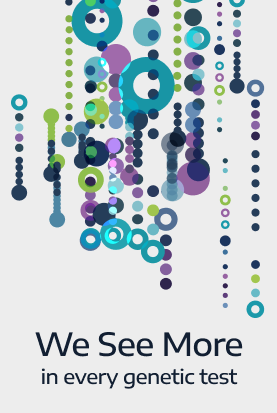Genomic Unity® Comprehensive Mitochondrial Disorders Analysis
Genomic Unity® Comprehensive Mitochondrial Disorders Analysis is a diagnostic test designed to identify genetic variants that cause mitochondrial disorders.
- Test Description
- When to Order
- Included Genes
- Included Analyses
- Turnaround Time
- Sample Types
- CPT Codes
- Methods and Limitations
Test Description
Genomic Unity® Comprehensive Mitochondrial Disorders Analysis is a targeted test that uses a whole genome platform to detect all major clinically relevant variant types from a single sample. This targeted test focuses on mitochondrial genome analysis combined with analysis of 336 nuclear genes associated with mitochondrial disorders.
Genomic Unity® Comprehensive Mitochondrial Disorders Analysis provides a single, unified clinical report that replaces a battery of tests including: multiplex ligation dependent probe amplification (MLPA) and single gene or targeted gene panel testing of nuclear genes plus eliminates the need to order separate testing for mitochondrial genes.
When to Order
Order this test when clinical symptoms affect multiple organ systems and are suggestive of a mitochondrial disorder.
Included Genes
AARS2, ABCB6, ABCB7, ACAD8, ACAD9, ACADM, ACADS, ACADSB, ACADVL, ACAT1, ACO2, ACSF3, AFG3L2, AGK, AGL, AIFM1, AK2, ALAS2, ALDH2, ALDH3A2, ALDH4A1, ALDH5A1, ALDH6A1, ALDH7A1, ALDH18A1, AMACR, AMT, APTX, ATP5A1, ATP5F1E, ATP7B, ATP8B1, ATPAF2, ATXN2, AUH, BAX, BCKDHA, BCKDHB, BCKDK, BCL2, BCS1L, BOLA3, C12ORF65, C19ORF12, CA5A, CARS2, CAVIN1, CHCHD10, CISD2, CLPB, CLPP, COA5, COA6, COA8, COQ2, COQ4, COQ6, COQ8A, COQ8B, COQ9, COX4I2, COX6A1, COX6B1, COX7B, COX10, COX14, COX15, COX20, CPT1A, CPT1C, CPT2, CYC1, CYCS, CYP11A1, CYP27A1, D2HGDH, DARS2, DBT, DDC, DDHD1, DECR1, DGUOK, DHODH, DHTKD1, DIABLO, DLAT, DLD, DMGDH, DNA2, DNAJC19, DNM1L, EARS2, ECHS1, ELAC2, ETFA, ETFB, ETFDH, ETHE1, FAH, FARS2, FASTKD2, FBXL4, FDX2, FH, FOXRED1, FXN, G6PC1, GAA, GAMT, GATM, GBE1, GCDH, GCSH, GDAP1, GFER, GFM1, GFM2, GLDC, GLRX5, GLUD1, GPI, GPT2, GPX1, GRHPR, GSR, GSS, GTPBP3, GYS1, GYS2, HADHA, HADHB, HARS2, HAX1, HCCS, HK1, HMGCL, HMGCS2, HOGA1, HSD3B2, HSD17B10, HSPA9, HSPD1, HTRA2, IARS2, IBA57, IDH2, IDH3B, ISCA2, ISCU, IVD, KIF1B, L2HGDH, LARS2, LDHA, LIAS, LIPT1, LONP1, LRPPRC, LYRM4, LYRM7, MARS2, MCCC1, MCCC2, MCEE, MECR, MFF, MFN2, MGME1, MICU1, MLYCD, MMAA, MMAB, MMACHC, MMADHC, MMUT, MOCS1, MPC1, MPV17, MRPL3, MRPL12, MRPL44, MRPS7, MRPS16, MRPS22, MSRB3, MTFMT, MTO1, MTPAP, NADK2, NAGS, NARS2, NDUFA1, NDUFA2, NDUFA4, NDUFA9, NDUFA10, NDUFA11, NDUFA12, NDUFAF1, NDUFAF2, NDUFAF3, NDUFAF4, NDUFAF5, NDUFAF6, NDUFAF7, NDUFB3, NDUFB9, NDUFB11, NDUFS1, NDUFS2, NDUFS3, NDUFS4, NDUFS6, NDUFS7, NDUFS8, NDUFV1, NDUFV2, NFS1, NFU1, NNT, NUBPL, OAT, OGDH, OGG1, OPA1, OPA3, OXCT1, PAM16, PANK2, PARS2, PC, PCCA, PCCB, PCK2, PDHA1, PDHB, PDHX, PDK3, PDSS1, PDSS2, PET100, PFKM, PGAM2, PHKA1, PHKA2, PHKB, PHKG2, PHYH, PINK1, PKLR, PNPLA8, PNPT1, POLG, POLG2, PPM1K, PRKAG2, PRODH, PRPS1, PTRH2, PUS1, PYCR1, PYCR2, PYGM, QARS1, RANBP2, RARS2, REEP1, RMND1, RNASEH1, RNASEL, RRM2B, SARDH, SARS2, SCO1, SCO2, SDHA, SDHAF1, SDHAF2, SDHB, SDHC, SDHD, SERAC1, SFXN4, SLC6A8, SLC19A2, SLC19A3, SLC22A5, SLC25A1, SLC25A3, SLC25A4, SLC25A12, SLC25A13, SLC25A15, SLC25A19, SLC25A20, SLC25A22, SLC25A38, SLC25A46, SLC37A4, SOD2, SPG7, STAR, SUCLA2, SUCLG1, SURF1, TACO1, TARS2, TAZ, TIMM8A, TIMM44, TK2, TMEM70, TMEM126A, TMLHE, TPI1, TPK1, TRIT1, TRMU, TRNT1, TSFM, TTC19, TUFM, TWNK, TXNRD2, TYMP, UNG, UQCC2, UQCC3, UQCRB, UQCRC2, UQCRQ, VARS2, WDR81, WFS1, XPNPEP3, YARS2
Mitochondrial genes
MT-ATP6, MT-ATP8, MT-CO1, MT-CO2, MT-CO3, MT-CYB, MT-ND1, MT-ND2, MT-ND3, MT-ND4, MT-ND4L, MT-ND5, MT-ND6, MT-RNR1, MT-RNR2, MT-TA, MT-TC, MT-TD, MT-TE, MT-TF, MT-TG, MT-TH, MT-TI, MT-TK, MT-TL1, MT-TL2, MT-TM, MT-TN, MT-TP, MT-TQ, MT-TR, MT-TS1, MT-TS2, MT-TT, MT-TV, MT-TW, MT-TY
Included Analyses
- Mitochondrial genome analysis including: single nucleotide variants with heteroplasmy (≥5%), large deletions.
- Sequence analysis of nuclear mitochondrial disorder-associated genes including: single nucleotide variants, deletions, insertions, and characterized intronic variants.
- Copy number variant analysis of nuclear mitochondrial disorder-associated genes including: duplications/deletions, mobile element insertions, and inversions.
Optionally includes:
- Reflex to Genomic Unity® Exome Analysis, Genomic Unity® Exome Plus Analysis, or Genomic Unity® Whole Genome Analysis.
- Genomic Unity® Pharmacogenomics Analysis.
Turnaround Time
A report will be issued within 4 weeks. Turnaround time begins when samples and all required documents and approvals are received.
CPT Codes
81440, 81460, 81465
The CPT codes provided are for informational purposes only. CPT coding is the sole responsibility of the billing party. Please direct any questions regarding coding to the payer being billed.
Methods and Limitations
Genomic Unity® Comprehensive Mitochondrial Disorders Analysis uses a PCR-free whole genome sequencing (WGS) platform paired with our Genomic Intelligence® analytical software.
SNVs:
99.9% sensitivity
100% specificity
99.8% positive predictive value
Structural variants:
96% clinical sensitivity
Mitochondrial variants:
The false negative rate for mitochondrial large deletions has not been determined.
Test limitations:
The NDUFB11, PRODH and SLC6A8 genes are not fully covered by this test, therefore not all pathogenic variants may be detected. The PRODH and TMLHE genes contain regions that are non-unique, therefore not all variants can be assigned to the correct location, limiting interpretation.
